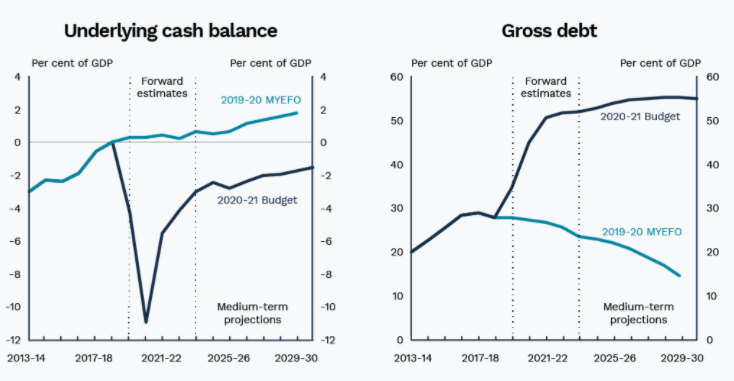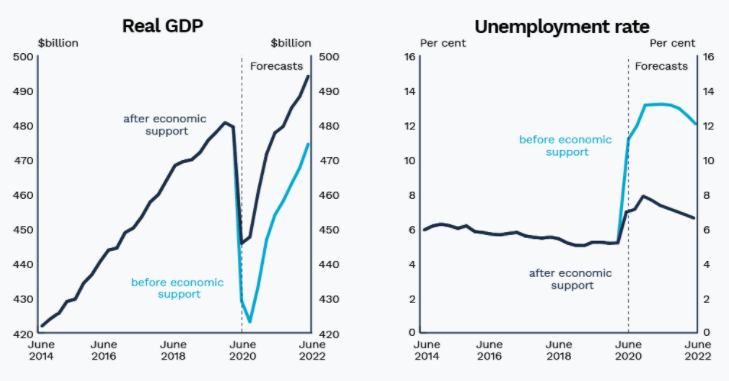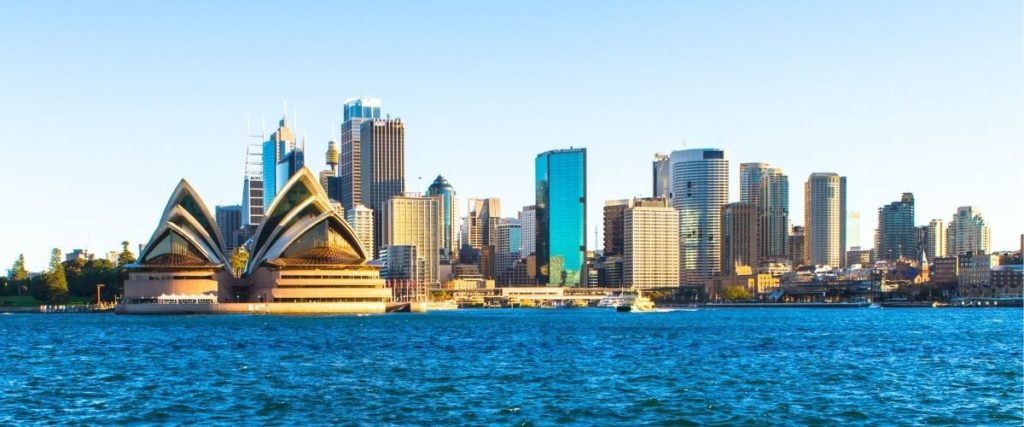Australia has pledged AUD 98 billion (USD 70 billion) to economic recovery on Tuesday in its latest 2020-21 budget. A substantial AUD 74 billion (USD 53 billion) – or 75% – of the budget will go towards creating jobs, while the remainder would go towards COVID-19 support.
The anticipated spend will put Australia into significant debt. The nation already anticipates an AUD 213.7 billion (USD 152.6 billion) deficit and AUD 703 billion (USD 502 billion) in debt by the end of this year.

Australia’s Underlying Cash Balance and Gross Debt Forecast (Source)
Treasurer Josh Frydenberg outlined a two-step plan on Tuesday, focusing on first “boosting consumer and business confidence, growing the economy and creating jobs” and, secondly, reducing debt once the economy had stabilised.
Under the new budget, an estimated 450,000 jobs would be subsidised for employees aged 16-35 under the JobMaker scheme. The new hiring credit scheme would provide subsidies of AUD 100 to 200 (USD 74 to 143) weekly per employee for the next 12 months in a move to boost employment rates of young locals.
A further AUD 1.2 billion (USD 860 million) will incentivise businesses to create approximately 100,000 apprenticeship and traineeship jobs via a 50% wage subsidy. “There is no economic recovery without a jobs recovery. There is no budget recovery without a job recovery,” stated Fryndenberg.

Australia’s Real GDP and Unemployment Rate Forecast (Source)
Businesses with a turnover of AUD 5 billion (USD 3.6 billion) and above will also be supported with instant asset write-offs from Tuesday onwards, helping to reduce business costs and promote capital investment.
Sector-specific government investments will also help boost manufacturing, domestic tourism, and international trade. Frydenberg detailed an AUD 1.3 billion (USD 930 million) Modern Manufacturing plan encompassing six sectors: F&B, resources technology and critical minerals processing, medical products, recycling and clean energy, defence, and space. He also pledged AUD 350 million (USD 250 million) to promote domestic tourism and AUD 317 million (USD 230 million) to support global supply chains for Australian exporters.
In a controversial move, Fryndenberg also announced tax cuts for 11 million Australians, which will favour high-earners. “Tax cuts will put more money into the pockets of 11 million hardworking Australians and their families,” said Fryndenberg. However, the policy, which will now take effect a year earlier in July 2021, has been criticised for giving the biggest benefits to those who earn AUD 120,000 (USD 86,000) or more, according to the Guardian.
The government also announced new visa requirements on Tuesday that will impose a minimum English competency requirement on applicants. “New partner visa applicants and permanent resident sponsors will have to show evidence of possessing functional level English skills in order to be eligible, set to take effect from late 2021,” said Acting Minister for Immigration Alan Tudge.
The policy has been heavily criticised by representatives from the Labor Party for being discriminatory against lower-income applicants. “It’s come about without any context, and it doesn’t recognise the multicultural nation we are today,” said Labour MP Andrew Giles in an interview with SBS.
In a press release on Wednesday, Prime Minister Scott Morrison responded to the criticism, touching upon the factors of consideration behind the policy. “The new requirement would promote social and economic inclusion. It’s a much more basic level of English language competency and we think this is important to just enable people to engage to access government services.”
In a bid to promote integration, the United Kingdom introduced a similar English language requirement in June 2010, requiring anyone in need of an entry clearance into the country to produce evidence of basic English competence.
Related Articles
Australia Injects AUD 50 Million in Grants to Support Business Events
Singapore Reaffirms Diplomatic Ties with China, Despite Rising US-China Tensions
US Tech Sanctions on SMIC will Affect Huawei, Apple, Samsung





